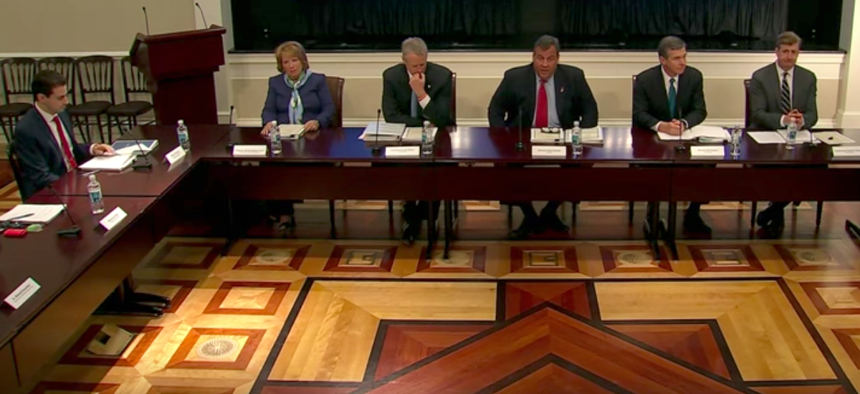At the 1st Meeting of Trump’s Opioid Commission, Medicaid Was the Elephant in the Room

President Trump's opioid commission met on Friday. Via White House Video
Members of the group reflected upon the importance of the federal program to the fight against the opioid epidemic, as the U.S. Senate debates the program’s future.
WASHINGTON — At the first meeting of President Trump’s Commission on Combating Drug Addiction and the Opioid Crisis, former U.S. Rep. Patrick Kennedy was one of the first to name what he called the “elephant in the room”—Medicaid.
Medicaid, he said “is the largest provider of coverage for people with mental illness and addiction in this country. So, we have to mention the fact that any repeal of Medicaid is a repeal of coverage that we currently have out there.”
His remarks were a not-so-subtle reference to the American Health Care Act, a bill making its way through the Senate that would cut federal funding to Medicaid by as much as $834 billion over the next decade.
Kennedy, a Democrat who represented Rhode Island’s 1st congressional district from 1995 to 2011, has first-hand experience with opioid addiction, experience he mentioned in his opening remarks. He has received medication-assisted treatment, and he has participated in a 12-step recovery program. Meaning, as he said, “this is personal.”
Kennedy wasn’t the only member of the commission to bring up the federal program. North Carolina Gov. Roy Cooper also used his allotted time to tie the fate of the AHCA—and the fate of Medicaid—to the future of the opioid crisis.
“At the addiction level we need treatment and prevention,” said the Democratic governor. “And we’re kidding ourselves if we don’t think that what is happening over in Congress regarding issues of health care, matters to this issue.”
“If we make it harder and more expensive for people to get health care coverage, it’s going to make this crisis worse,” Cooper said.
And, at least one of the guests of the commission who was invited to testify spoke on behalf of the program.
Dr. Mitchell Rosenthal, the deputy chairman of the National Council on Alcoholism and Drug Dependence drove home the importance of Medicaid coverage for people who are in treatment for addiction.
Rosenthal cited two Medicaid facts in his testimony: By 2026, 14 million people will be uninsured as a result of loss of Medicaid coverage due to the AHCA. And, approximately 30 percent of all the people who received health insurance coverage through the Affordable Care Act Medicaid expansion have either a mental health or substance use disorder, or both.
And, almost every single commission member and expert invited to testify mentioned the importance of medication-assisted treatment, but, what wasn’t mentioned was the critical role Medicaid plays in paying for that treatment.
Some of the states with the highest rates of opioid overdose deaths have used the federal program to increase access to MAT. In Kentucky, Maine, Ohio, Pennsylvania and West Virginia, for example, Medicaid pays for 35-50 percent of all such treatment.
In many ways, if the Senate votes “yes” on the AHCA—and the Medicaid reforms pass along with it—Trump’s commission will be operating in a very different health landscape that it is today. A fact Kennedy highlighted in his own remarks:
“I hope the commission can come up with some solutions,” Kennedy said, “given whatever happens within the next few weeks on the hill—as to how this nation is going to decide to go forward with Medicaid—to ensure we don’t step back at just the point we need to be stepping forward on this terrible epidemic.”
Quinn Libson is a Staff Correspondent for Government Executive’s Route Fifty based in Washington, D.C.

NEXT STORY: How 7 Mayors Responded to Trump’s Immigration Decision to Keep DACA, Drop DAPA






